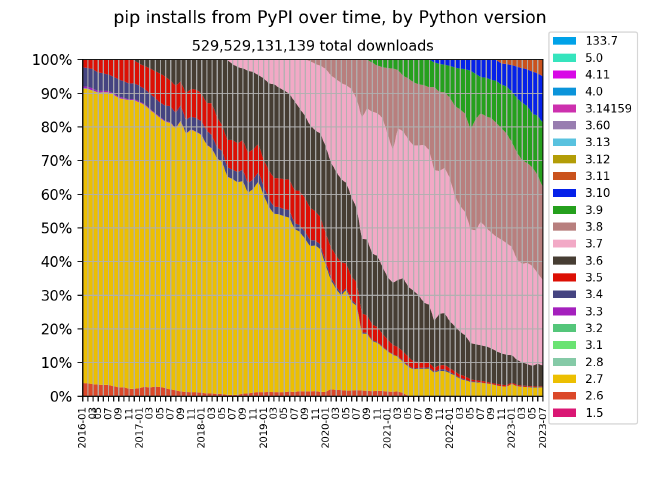Why are there still so many downloads for EOL Python 3.7?

Table of Contents
Python 3.7 was first released on 2018-06-27 and recently reached end-of-life on 2023-06-27 (PEP 537).
This means it is no longer receiving security updates and you should upgrade to a newer version (at least 3.8, but preferably 3.11):

However, if you look at download numbers from PyPI, 3.7 still accounts for a large share. 3.7 accounted for 25% of all downloads from PyPI in July 2023, compared with 27% for 3.8:

But why does such an old Python version have so many downloads?
All downloads #
Let’s dig into the numbers using a handy tool called pypinfo, which helps us analyse the PyPI data from Google BigQuery.
This command fetches all of yesterday’s downloads per Python version:
pypinfo --days 1 --percent --markdown "" pyversion
| Python version | percent | download count |
|---|---|---|
| 3.8 | 25.00% | 189,678,872 |
| 3.7 | 23.35% | 177,150,010 |
| 3.9 | 20.25% | 153,663,903 |
| 3.10 | 15.52% | 117,751,108 |
| 3.11 | 6.90% | 52,381,884 |
| 3.6 | 6.29% | 47,749,879 |
| 2.7 | 2.32% | 17,602,650 |
| 3.5 | 0.23% | 1,778,388 |
| 3.4 | 0.10% | 770,135 |
| 3.12 | 0.03% | 224,223 |
| 3.13 | 0.00% | 3,920 |
| 3.3 | 0.00% | 1,165 |
| 2.8 | 0.00% | 57 |
| 3.2 | 0.00% | 35 |
| None | 0.00% | 3 |
| Total | 758,756,232 |
All downloads by OS #
But what happens if we check which distros are responsible for those downloads?
This command gives us the top 20:
pypinfo --days 1 --limit 20 --percent --markdown "" system distro pyversion
| system name | distro name | Python version | percent | download count |
|---|---|---|---|---|
| Linux | Ubuntu | 3.8 | 18.87% | 128,991,062 |
| Linux | Amazon Linux | 3.7 | 14.44% | 98,738,952 |
| Linux | Ubuntu | 3.9 | 12.14% | 83,019,828 |
| Linux | Ubuntu | 3.10 | 9.66% | 66,019,309 |
| Linux | Ubuntu | 3.7 | 5.89% | 40,257,060 |
| Linux | Debian GNU/Linux | 3.8 | 5.70% | 38,958,367 |
| Linux | Debian GNU/Linux | 3.9 | 5.63% | 38,482,436 |
| Linux | Debian GNU/Linux | 3.7 | 4.25% | 29,035,532 |
| Linux | Debian GNU/Linux | 3.10 | 4.15% | 28,348,346 |
| Linux | Debian GNU/Linux | 3.6 | 3.14% | 21,441,883 |
| Linux | Ubuntu | 3.11 | 3.01% | 20,570,619 |
| Linux | Debian GNU/Linux | 3.11 | 2.72% | 18,588,584 |
| Linux | Amazon Linux | 3.9 | 2.43% | 16,593,595 |
| Linux | CentOS Linux | 3.6 | 1.70% | 11,605,142 |
| Linux | Amazon Linux | 3.8 | 1.47% | 10,035,087 |
| Linux | Amazon Linux | 3.10 | 1.46% | 9,969,514 |
| Linux | Ubuntu | 2.7 | 1.02% | 6,960,697 |
| Linux | Amazon Linux AMI | 3.6 | 0.79% | 5,390,823 |
| Linux | Ubuntu | 3.6 | 0.79% | 5,388,370 |
| Windows | None | 3.10 | 0.76% | 5,227,519 |
| Total | 683,622,725 |
We can see Ubuntu with 3.8 is responsible for the largest share of 17%. (That’s fine, 3.8 is supported until 2024-10-14.)
The next is Amazon Linux with 3.7, responsible for a whopping 15% of all downloads!
The others responsible for 3.7 have a much lower share: Ubuntu (6%) and Debian (4%).
Tip: replace "" in the commands above with a package name to get data for just that
package, for example:
pypinfo --days 1 --limit 20 --percent --markdown requests system distro pyversion
Header photo: Space shuttle Discovery landing at Edwards Air Force Base, California, 9th December, 1992 (source: NASA on The Commons)